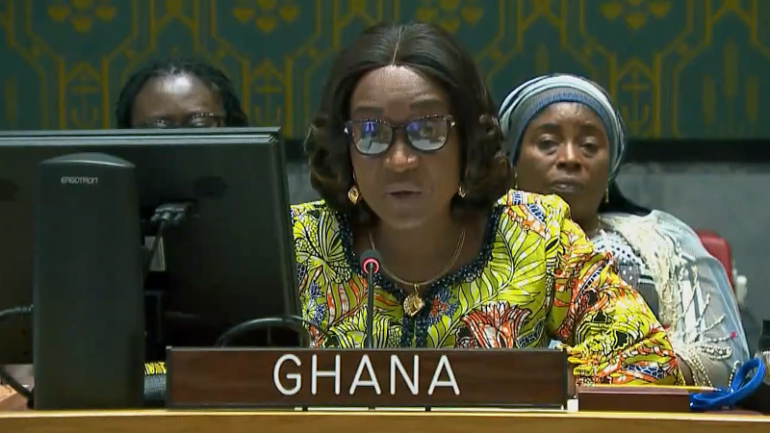United Nations Security Council High Level Open Debate on Women, Peace and Security. Keeping the promises

- Posted by admin
- Posted in Statement & Remarks, UNSC
UNSC HIGH LEVEL OPEN DEEBATE KEEPING THE PROMISES: THE ROLE OF REGIONAL ORGANISATIONS IN IMPLEMENTING WOMEN, PEACE AND SECURITY IN THE FACE OF POLITICAL TURMOIL AND SEIZURES OF POWER BY FORCE
Hon. Abena Osei-Asare
Deputy Minister for Finanace
UNSC Chamber, New York
Madam President,
Since the unanimous adoption of Resolution 1325 over two decades ago, discourses and efforts geared towards the full, equal and meaningful participation of women in peace and security have received unprecedented international momentum and yielded positive outcomes, with significant promise for increased success if we all commit to this important global objective and keep the
promises. Ghana welcomes the emphasis placed on this high-level open debate on the role of regional organisations in implementing the three main thematic tracks of the women, peace and security agenda in the face of political turmoils, and commend the Albanian delegation for directing our collective attention towards this. On this note we welcome the presence of H.E. Olta Xhaçka, Minister for Europe and Foreign Affairs of Albania and commend Your Excellency for the able manner in which you are chairing this meeting. I also wish to express appreciation to all the briefers for their rich perspectives which, rightly, point us to the need for action on the commitments we have all made.
Madam President,
The African story cannot be recounted without highlighting an essential component of the continent’s political and economic reality which is the progressive quest for a deepened regional integration, marked by economic prosperity and socio-political cohesion. Africa’s Regional Economic Communities (RECs) such as ECOWAS, SADC, ECCAS and the EAC, which serve as building blocks for continental integration, have had a long history of engagement with the aspirations of the people of the continent, even though the recurrence of socio-political conflicts has led to
the erosion of some gains in several instances. In moments of social and political unrest in several places in the world, WPS agents, against the odds of severe reprisals, marginalisation and outright hostility, continue to work towards the advancement, progress and stability of their communities.
It is also encouraging to observe the fervour and attention the WPS agenda has generated within regional and sub-regional organisations. The African Union and ECOWAS have incorporated crucial aspects of the agenda into their strategic objectives and operations. We commend, in particular, the efforts that are being made to nurture a culture of fervent national and regional
implementation backed by political will, as well as the desire, to protect women and give them a voice in society. In West Africa for instance, in acknowledgement of the contributions of women in building peaceful and stable societies, ECOWAS has developed legal frameworks to assure the role of women in governance, electoral processes, conflict prevention and resolution as well as peacebuilding. The region is both mindful of the need to protect the rights of women and girls from conflict-related sexual violence and deeply appreciative of the role that women groups at national and regional levels have played in the resolution of conflicts such as those that occurred in Liberia, Sierra Leone and Cote d’Ivoire in the early 2000s. We recall, in this regard the critical role that the Mano River Women’s Peace Network played in getting women represented in the peace processes of Liberia, Sierra Leone and Guinea as well as the roles others play in facilitating the participation of women in political activities.
The adoption in 2010 of the ECOWAS Regional Action Plan for the implementation of Resolution 1325 and related resolutions has also seen the inclusion of WPS elements into initiatives such as the regional Early Warning Systems, the development of a Gender and Elections Plan and the training of women mediators to support peace initiatives in the region. Through these, ECOWAS continues to work towards inclusive and participatory governance processes, including the rights and roles of women in peace and governance processes. These initiatives which have the primary intention of enabling the integration of women in the mechanisms of preventive diplomacy and mediation deserve full support.
In addressing more specifically the focus of today’s open debate, Ghana would make four (4) points.
First, there has to be a concerted effort to improve our collective resilience against conflict by diverting some of the global military expenditure towards investment in human security. In this way we can channel much needed funds into WPS initiatives aimed at conflict prevention.
Secondly, we must encourage cross-collaboration among regional organisations on the WPS agenda. This would ensure the effective exchange of best practices across regions and deepen partnerships to bridge knowledge gaps required to support women’s empowerment initiatives.
Thirdly, we urge the Council to request the Secretary General to ensure the allocation of targeted, practical and rapid resources to facilitate responses to threats against women peacebuilders or avert the dangers they may face, especially in the context of military coups. The Council can also ensure that peace operations are adequately resourced to address the challenges encountered by UN entities and member states in monitoring, reporting and providing support to women peacebuilders.
Finally, we urge that regional organisations in collaboration with the United Nations actively promote women’s participation in mediation through training programs and the creation of a database of women mediators at the regional level. Also, organisations should take special measures to ensure full participation by actively employing women as special envoys and senior mediators.
Madam President,
In concluding, I would like to reiterate that Ghana remains fully committed to the full, equal and meaningful participation of women, in peace processes, especially in the context of conflict,
where their interventions matter most. Through our membership of AU and ECOWAS, we will continue to contribute to building a robust regional WPS framework characterized by tangible action leading to the attainment of desirable outcomes.
I thank you, Madam President.
